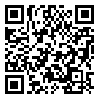Volume 23, Issue 3 (May-Jun 2015)
JSSU 2015, 23(3): 2032-2039 |
Back to browse issues page
Abstract: (6551 Views)
Introduction: Necrotizing enterocollitis (NEC) is one of the common causes of mortality and morbidity in premature neonates. Prematurity and abnormal bacterial colonization are regarded as the most prevalent causes of NEC. Some studies have supported the fact that administration of probiotics decreases NEC and mortality in premature neonates. Therefore, this study aimed to investigate the effect of probiotics on prevention of NEC in premature neonates.
Methods: In this double blind randomized clinical trial, 49 premature neonates were evaluated aged less than 36 weeks and weighed 1000-2500. Neonates were randomly distributed into two groups of experimental and control. The former group received oral probiotics, whereas the latter group had normal saline. At the end of study, time of full enteral feeding, duration of hospital admission, discharge weight, incidence and severity of NEC as well as death rate were examined.
Results: No significant differences were observed between the two groups in regard with cause of admission, whereas there was a significant difference in time of achieving full enteral feeding between the two groups. Moreover, a significant difference was reported in duration of hospital admission between the two groups. The prevalence of NEC in probiotics group and placebo group was 67% and 20% respectively, which was reported to be a significant difference.
Conclusion: The study findings revealed that Probiotics could prevent NEC in premature neonates. Furthermore, probiotics could decrease time of achieving full enteral feeding and duration of admission.
Type of Study: Original article |
Subject:
Pediatrics
Received: 2015/01/2 | Accepted: 2015/03/9 | Published: 2015/06/7
Received: 2015/01/2 | Accepted: 2015/03/9 | Published: 2015/06/7
| Rights and permissions | |
 |
This work is licensed under a Creative Commons Attribution-NonCommercial 4.0 International License. |


